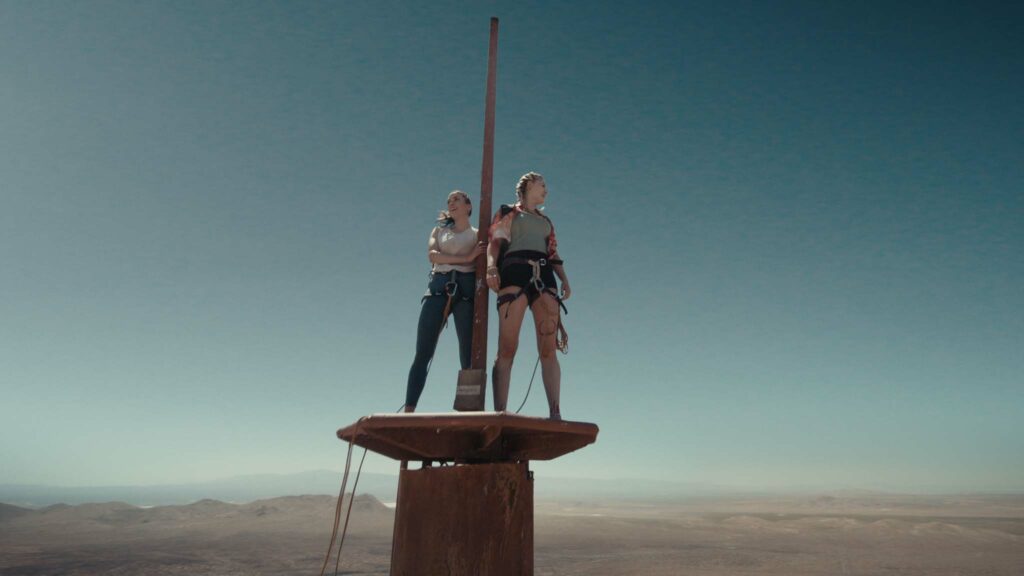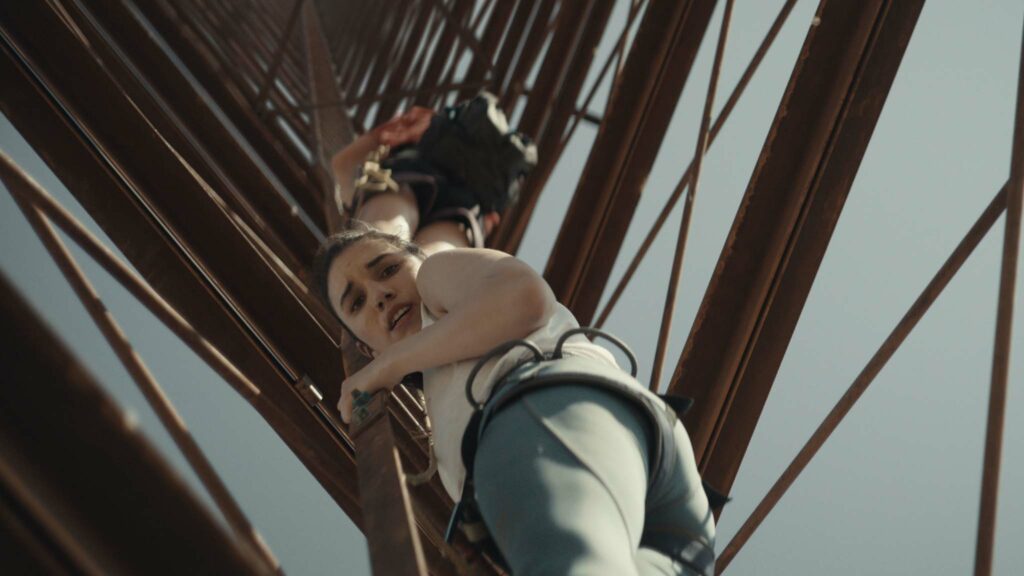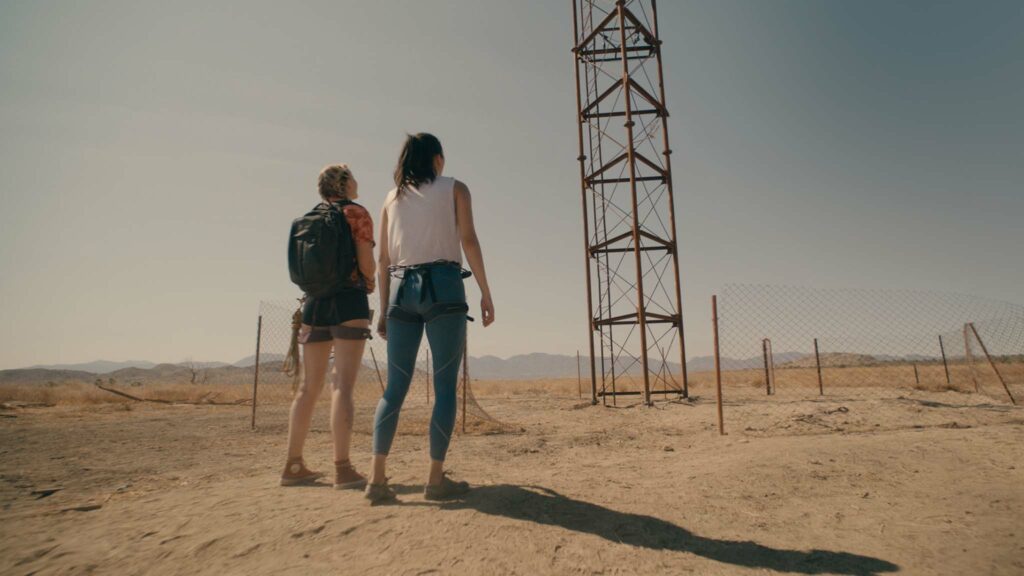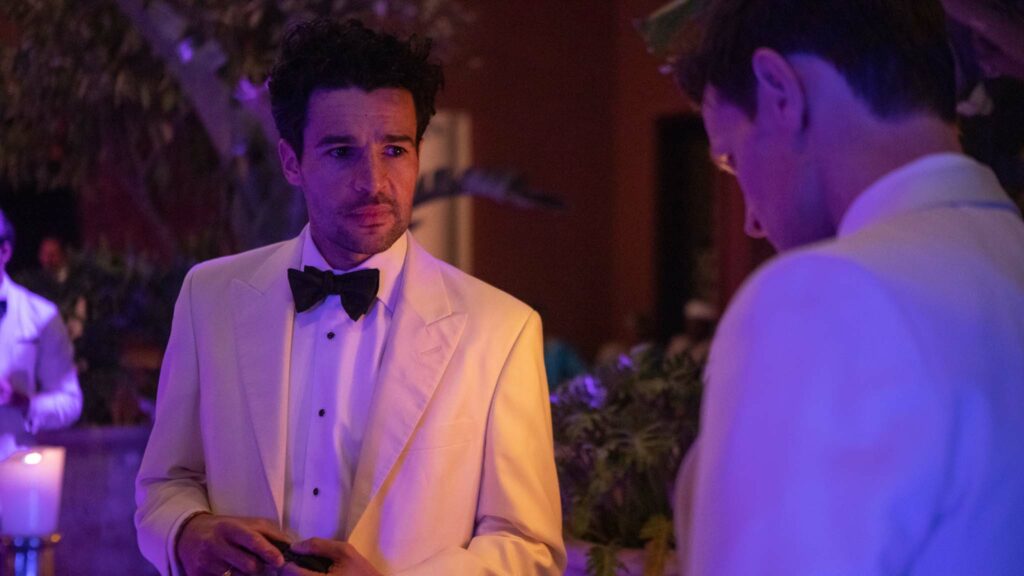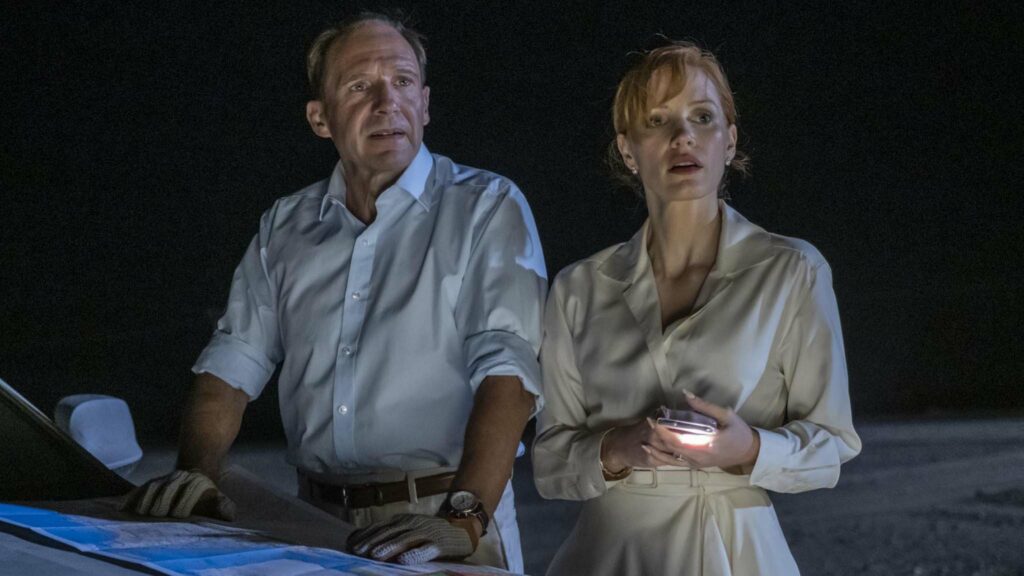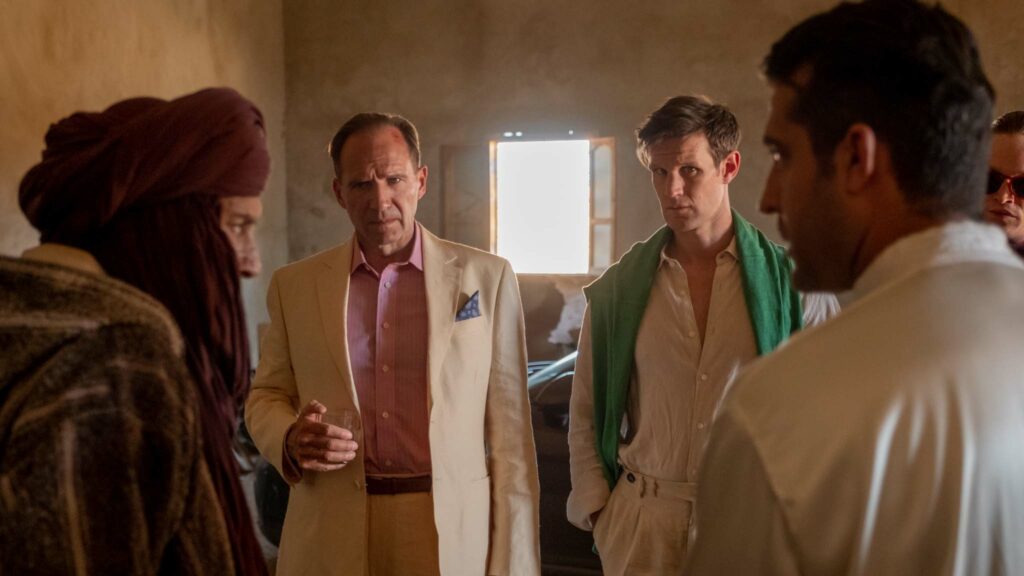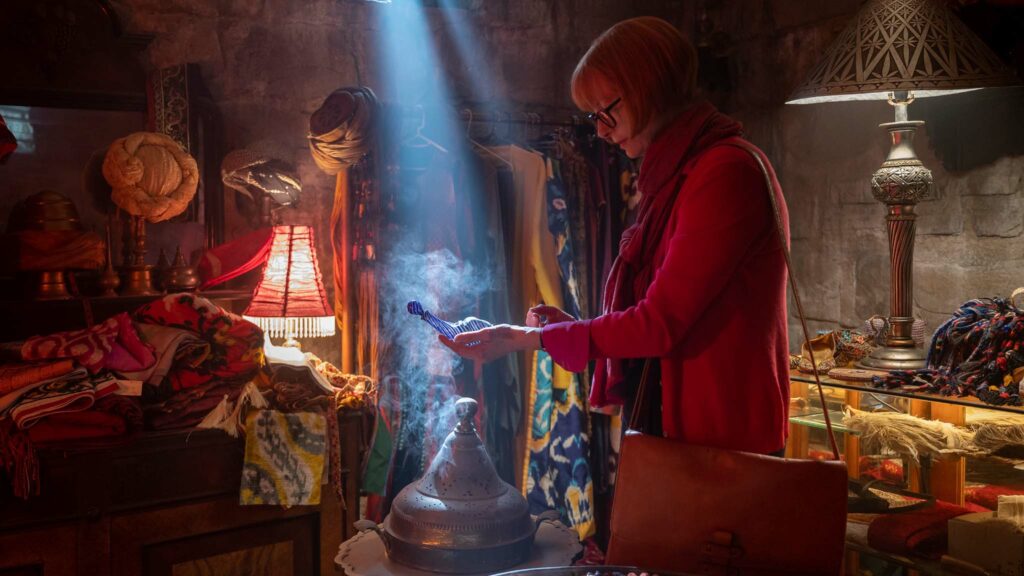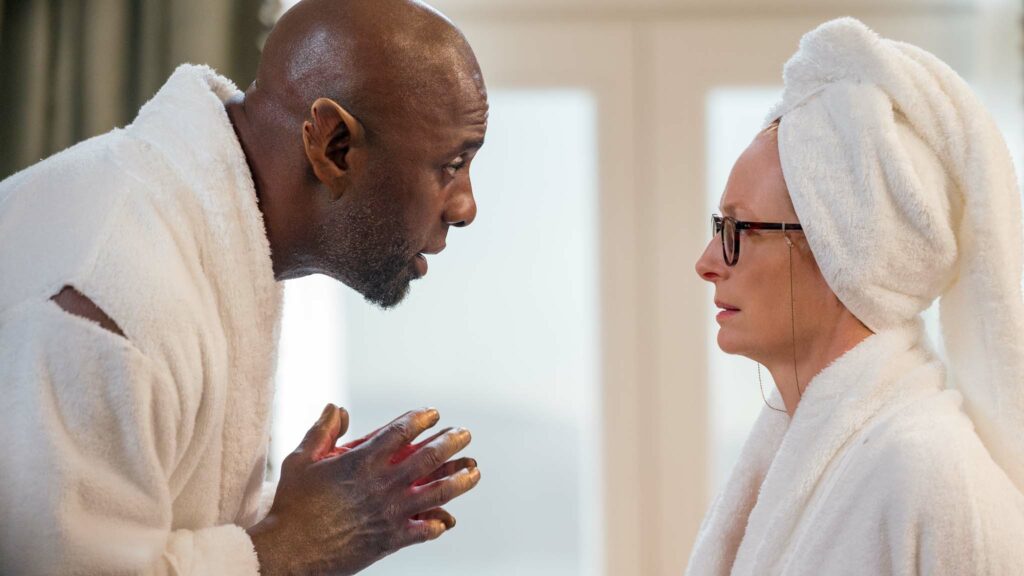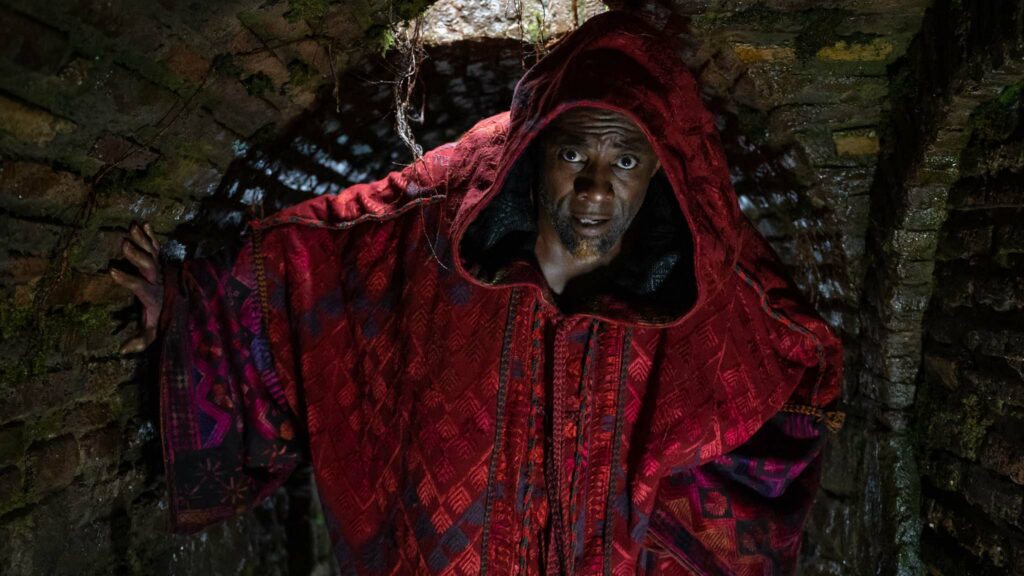Thriller
Fall (15)
Review: Gravity kills in the aptly titled Fall, which suspends disbelief 2,000 feet in the air atop an abandoned TV tower, where two best friends become stranded a little over half an hour into director Scott Mann’s dizzying survival thriller. The stakes are stomach-churningly high in a lean and ruthlessly efficient script co-written by Jonathan Frank and Mann, which defies common sense to cajole two female protagonists to the pinnacle of a rust-eroded needle in the middle of a desert in memory of a fallen spouse.
Once co-stars Grace Fulton and Virginia Gardner have finished spouting platitudes (“You are so much stronger than you think you are!”) and reality bites, Fall asks us to hold on tight as stricken yet resourceful characters engineer ways to attract attention to their precarious perch. As a breathless thrill ride, Mann’s picture maintains an assured grip through some risible interludes like one heroine instantly thinking of social media when the tower’s structure disintegrates (“I wish we’d filmed that!”) or the fleeting menace posed by a pair of voracious vultures.
Whirling camerawork jangles the nerves of anyone who suffers from acrophobia and distracts attention from some storytelling sleight of hand that lands with a satisfying thud. In a vertiginous, coolly executed opening sequence, Becky (Fulton), her husband Dan (Mason Gooding) and best friend Hunter (Gardner) are rock climbing when tragedy strikes. Dan is startled by a bird nesting in a handhold and plummets to terra firma.
Almost a year later, widow Becky is a booze-sodden, emotional wreck, who is dodging telephone calls from her deeply concerned father (Jeffrey Dean Morgan) and contemplating an overdose of pills rather than endure another day without her soulmate spouse. Hunter has been monetising her daredevil antics on social media under the gnarly moniker Danger D and she re-establishes contact with Becky on the anniversary of Dan’s death with a daring proposal to spread his ashes from the top of the B67 TV tower, supposedly the fourth tallest structure in America.
Embracing her late husband’s nonsensical mantra (“If you’re scared of dying, don’t be afraid to live”), Becky attaches herself to Hunter with 50 feet of rope and the pals clamber 1,800 feet up an internal ladder within the tower’s cage frame, followed by a 200 feet climb of an external ladder to the summit. The structure is fatally compromised, stranding Becky and Hunter at the top with no way down.
Fall does exactly what it says on the rusty tin, putting two thinly sketched characters (who are entirely to blame for their high-rise misery) through the wringer with sadistic glee. Sympathy is in short supply despite Fulton and Gardner’s best mascara-smeared efforts to tug heartstrings. Logic base jumps before Becky and Hunter reach the summit.
Find Fall in the cinemas
Thriller
The Forgiven (18)
Review: Bafta-nominated writer-director John Michael McDonagh has an enduring fascination with emotionally, morally and spiritually conflicted characters, who behave badly (sometimes abominably) in the name of self-fulfilment and -preservation. Punishments don’t necessarily fit the crime in McDonagh’s darkly comedic world and few of his protagonists seek forgiveness for their actions. Contrary to the title, adapted from Lawrence Osborne’s best-selling 2012 novel, The Forgiven doesn’t grant absolution to any of the vile bodies that congregate in the Moroccan desert in the aftermath of a fatal car accident that is covered up with the collusion of local police.
White privilege and western superiority trump justice and McDonagh invites us to seethe with disbelief when the driver of the vehicle ruefully suggests that the death of an Arab boy can be swatted from memory because, “the kid is a nobody.” He forgets that every nobody has blood ties to somebody. McDonagh doesn’t. Anchored by a formidable lead performance from Ralph Fiennes as an acid-tongued, high-functioning alcoholic, this slow-burning morality tale cranks up tension as grief collides head-on with guilt and a nervous quest for atonement seems destined to end in abject failure. Characters are unlikeable by design but it’s still possible to feel fleeting pangs of pity as McDonagh impales his loathsome creations on hooks and lets them wriggle.
Richard Galloway (Matt Smith) and his wine-guzzling partner Dally (Caleb Landry Jones) invite a coterie of odious, privileged friends to their villa in the Moroccan desert for a weekend of lavish revelry and self-congratulation. The guest list includes British aristocrat Lord Swanthorne (Alex Jennings), French journalist Isabelle Peret (Marie-Josee Croze) and American financial analyst Tom Day (Christopher Abbott). House staff led by Hamid (Mourad Zaoui) are horrified by wanton displays of hedonism, drugs-taking and sexual promiscuity.
British doctor David Henninger (Fiennes) and his American writer wife Jo (Jessica Chastain) get lost en route from Tangier. He blames her map navigational skills. “It’s Morocco not Milton Keynes!” she seethes. They are immersed in another argument when young fossil seller Driss (Omar Ghazaoui) steps into the desert road in front of their speeding car to ply his wares. The Henningers arrive late at Richard’s soiree, claiming the boy’s death was an accident. Driss’s father Abdellah (Ismael Kanater) materialises with an English-speaking associate (Said Taghmaoui) to claim his son’s body. The grieving patriarch insists David should witness the teenager’s burial and the pompous Brit reluctantly obliges.
Blessed with finely calibrated performances, The Forgiven is most compelling when Fiennes is on screen, marinating in his character’s discomfort. Pacing is glacial and every time McDonagh cuts away to the manifold transgressions within the villa, the two-hour running time seems to stretch, without the reward of an emotional pay-off.
Find The Forgiven in the cinemas
Fantasy
Three Thousand Years Of Longing (15)
Review: Storytelling is firmly embedded in our cultures and the tradition has assumed myriad forms throughout history including cave painting, hieroglyphs, sculpture, theatre, manuscripts, tapestry, cinema and comic books. Loosely adapted from AS Byatt’s short story The Djinn In The Nightingale’s Eye by Mad Max director George Miller and Augusta Gore, Three Thousand Years Of Longing is a visual effects-laden fantasy that trades automotive carnage in a futuristic Australia for dreamy contemplation in the company of a shape-shifting trickster from Middle Eastern folk tales. The adventures of street urchin Aladdin, commonly associated with One Thousand And One Nights, urge extreme caution when it comes to wish-fulfilment.
The warning is heeded by Tilda Swinton’s bookish heroine, a scholar of narrative structure in literary theory, who distils her outlandish odyssey to present-day Turkey in a format commonly associated with magic. “My story is true. You’re more likely to believe me if I tell it as a fairy tale,” she coos in an opening voiceover, heralding the arrival of Idris Elba as a genie. Performances play second fiddle to eye-popping visuals including blood-soaked battle sequences in the 17th-century Ottoman Empire and artfully staged bathhouse nudity. Some of the digital trickery might wish for a polish and on-screen chemistry between the leads only achieves a polite fizz but Miller’s directorial brio is wondrous.
Narratologist Alithea Binnie (Swinton) is a solitary creature by nature, summarising her disposition as “adequately happy and alone… by choice”. She travels from London to Istanbul for a conference, armed with a passion for the history of storytelling. In the bustle of the Grand Bazaar, Alithea is drawn to a delicately twisted blue and white glass bottle, which the shopkeeper explains is a pattern known as the Eye of the Nightingale. Alithea purchases the trinket and back at her hotel, in the same room that Agatha Christie supposedly wrote Murder On The Orient Express, she cleans dirt from the stopper with an electric toothbrush.
In a cloud of computer-generated smoke and static, an ancient Djinn (Elba) is unleashed and promises to grant three wishes. Well-versed in cautionary tales, Alithea refuses the Djinn’s tantalising offer and asks questions instead. Consequently, the spirit spins three yarns, weaving together the romance of Sheba (Aamito Lagum) and Solomon (Nicolas Mouawad), the tragic ambitions of a concubine (Ece Yuksel) and her prince (Matteo Bocelli), and the frustrations of a Turkish merchant’s wife (Burcu Golgedar).
Three Thousand Years Of Longing gallivants through time to underline a universal truth: love walks hand-in-hand with loss. Infused with hope and beauty, Miller’s dazzling yet flawed vision distils familiar tropes in technically ambitious flourishes, and couldn’t wish for more lavish or lustrous production design. A slice of Turkish delight.
Find Three Thousand Years Of Longing in the cinemas


